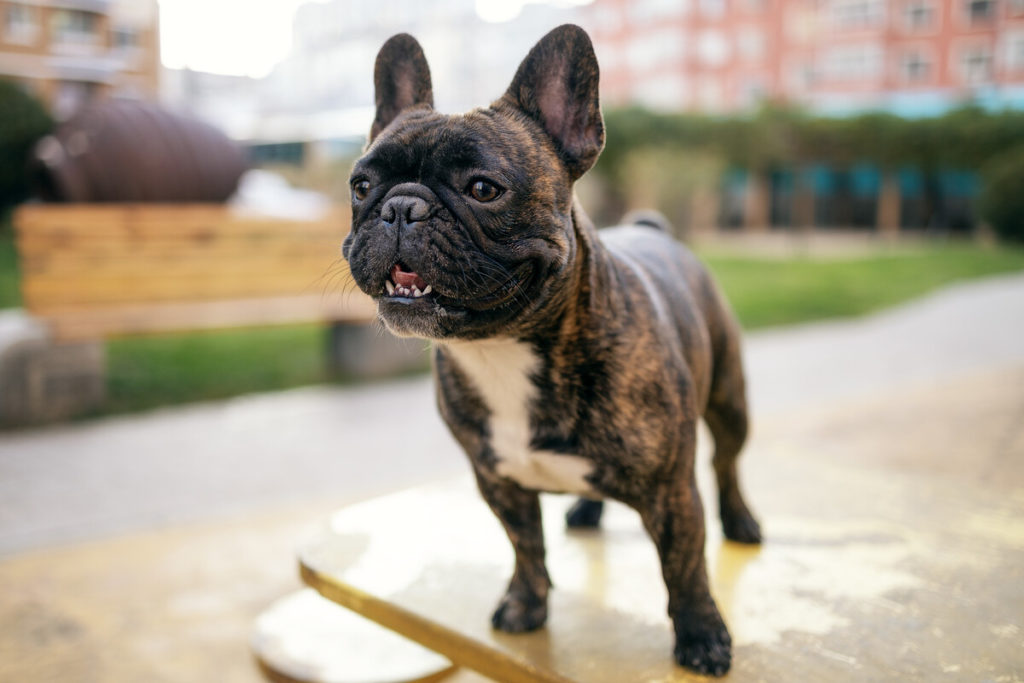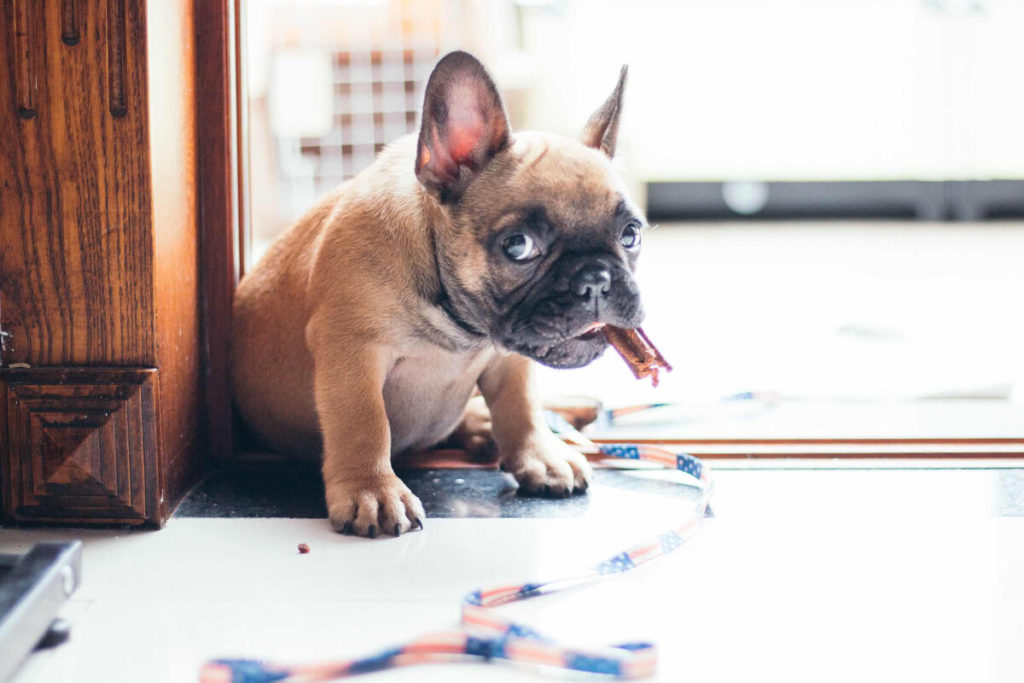The first thing that comes to our mind after bringing in home a Golden Retriever Puppy is “How to feed a Puppy?” How many of you know that the fact that the first step of Puppy illness is laid in its digestive system? A poorly functioning digestive system is the root cause of all illness in your pet.
Since ages Dogs and humans started living together so closely, and sometimes we forget the fact that they are animals. Just look at its Teeth. Proper Puppy nutrition starts with a proper understanding of its digestive system.
Understanding the Dog Digestive system
Your Golden has one of the shortest digestive systems of all mammals, we humans have longer ones. Their Stomach has stronger acids to digest animal proteins and fats. In such harsh acidic conditions, some enzymes that are suitable for digesting high carbohydrate diets cannot survive. Hence feeding a high carbohydrate diet is not suitable for your Golden Retriever Puppy. Their saliva even does not contain enzymes to digest the food. So they are different from us, they are primarily carnivores. You need proof, look at its teeth once again. They are sharp and strong enough to tear off your flesh.

Nature knows perfectly which kind of food is suitable for them. Have you seen wolves eating meat? Nature has provided meat to wolves and Dogs are almost similar to wolves, they are like relatives. As a result of living with humans, dogs have gone through evolutionary processes which made them out of the track and they acquired the little capacity of digesting carbohydrates.
What is the Best food for a Golden Puppy?
Every one of you wants to give the best food to your Golden Retriever Puppy. Gone are the days when Dogs used to feed on scraps of human food. As a result, many options for Dog food are available nowadays.
The types are
KIBBLES:
These are commercially available pelleted Puppy food also known as Dry food. These are easy to store and easy to feed. Choosing a high-quality kibble is essential for proper growth and health of your Golden Retriever Puppy. A good kibble provides every nutrient essential required for your Golden Retriever puppy. But long-term health effects of commercially manufactured kibbles is still debated. Some still do not prefer feeding commercial food to their Puppies.
Important thing while feeding Kibbles
It is not preferable to feed dry kibble directly to your Golden Retriever puppy. Its always better to soak the kibbles in water before feeding your pet, because these kibbles get swollen after soaking in water.
Feeding dry kibbles can make your pet’s stomach swollen and eventually cause bloating issues. My Golden Retriever Simba had suffered from bloating issues after feeding him with dry kibbles, so i strongly suggest feeding kibbles after getting them soaked in water.
WET FOOD:
This kind of food is available in the form of cans and pouches. It is more hydrated and looks like gravy. Various brands of wet foods are available and always choose the high-quality one.
BARF:
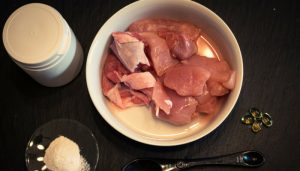
It is Biologically Appropriate Raw Food. Simply its Raw meat, the food Dogs used to eat in the wild. Feeding Raw meat is debatable and a certain section of people oppose it due to the risk of the presence of bacteria such as E.coli and salmonella, and some people prefer feeding their dogs with raw food.
HOME COOKED Golden Retriever PUPPY FOOD:
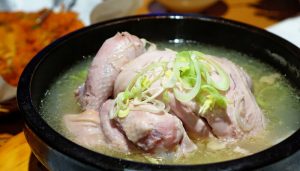
Finally, it’s homemade food. By the way, I feed my puppies this way. There are certain issues involved in feeding homemade food for puppies. It is difficult to provide all the nutrients necessary for a growing puppy through homemade food, Thus proper care is to be taken to ensure that the puppy is fed with nutrient-rich food. Feeding proper nutrients ensures good immune system and enhances your Golden Retriever puppy’s overall health.
Homemade food for Golden Retriever Puppy
Two Rules for preparing a puppy food
Rule 1
Ensure that all the vitamins and nutrients are available to your Golden Retriever puppy. The homemade food should be Nutrient-rich
Rule 2
Don’t forget this Ratio of 70% Protein+20% Complex Carbohydrates+10% Fruits and Vegetables.
Whatever you prepare, don’t forget these Thumb Rules.
Protein :
Choose good quality meat and poultry. Feeding organic meat can be highly beneficial. You can also include a small portion of organ meat such as liver, kidneys, and heart. Include fish like Salmon to provide Omega 3 fatty acids to your Golden Retriever puppy.
You can also choose lentils such as Split yellow and Split red which are good sources of protein. Don’t overfeed lentils as it might cause flatulence. Small amounts of them are good for your Golden Retriever puppy. On the whole, don’t forget the fact that your Golden is primarily a meat-eater.
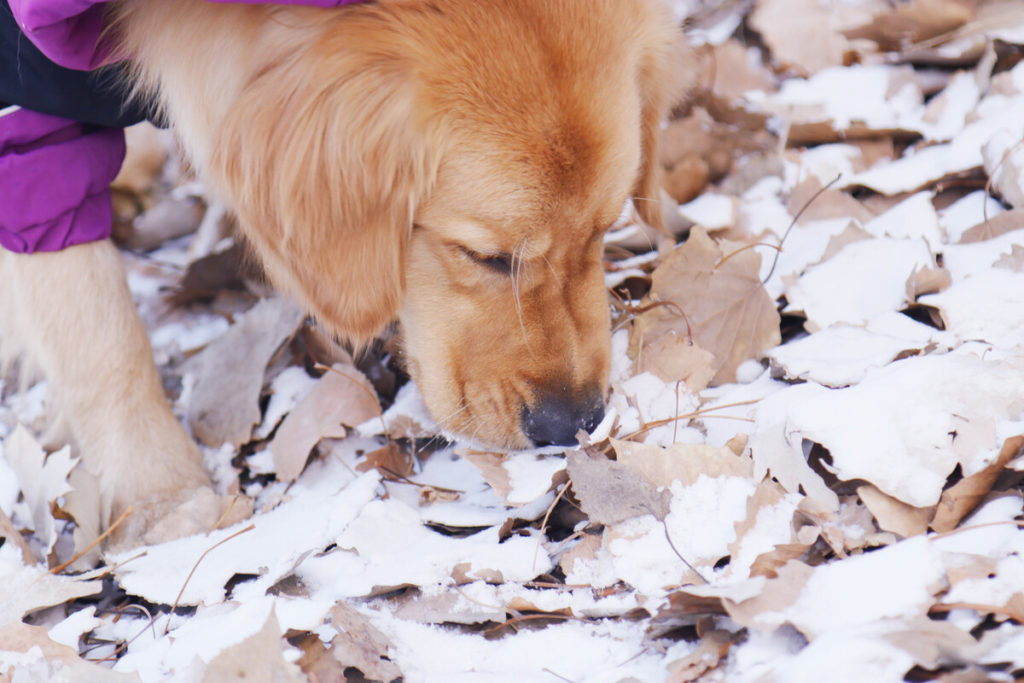
Carbs:
Include Complex Carbohydrates such as brown rice, oats, whole wheat and sweet potatoes which fulfil the energy requirements of your Golden Retriever puppy.
Vegetables and Fruits:
Small quantities of vegetables and fruits such as carrots, beet pulp, green beans, apples, and pumpkins are beneficial. Don’t overdo them. Avoid feeding corn as it may lead to weight gain which further causes joint problems especially in Golden Retrievers.
Calcium and other Nutrients:
Provide the required amounts of vitamins and minerals such as calcium for your Golden Retriever puppy. Calcium ensures proper growth of bones and joints. Feeding yogurt can be beneficial but don’t feed flavoured yogurt which contains excessive sugars.
One common question everyone has in their minds after bringing in home a new puppy is
How much should I feed my Golden Retriever Puppy?
I know Golden Retrievers are voracious eaters. Every time we feed our puppies, they look at us with a cute face like” Can I get some more food?” or “I am still hungry please feed me”
Puppies generally don’t know how much to eat. They continue to eat as much as we feed and later suffer from stomach aches and vomitings. So it is very important to take care of the feeding quantities.
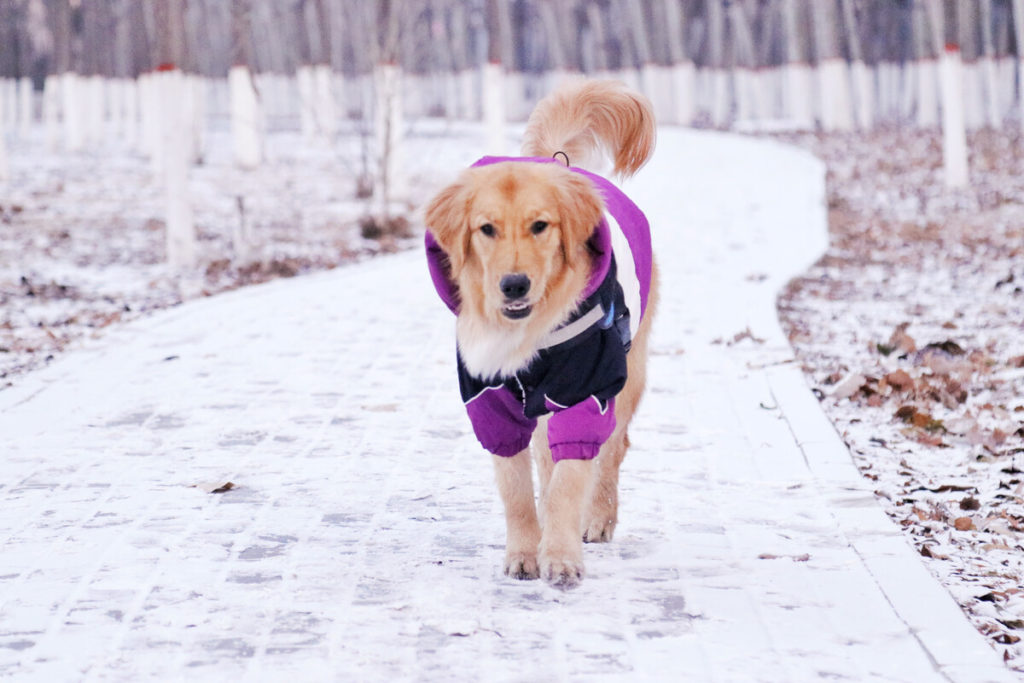
Dry foods have the data of prescribed quantity to be fed on the package itself. It is better to follow the instructions. It’s even fine to feed less rather than feeding more. Its digestive system should not be overloaded. Puppies have sensitive tummies, so proper care need to be taken to ensure that its digestive system doesn’t get damaged.
“Your Eyes are your best Guides”
- Observe the weight of the puppy. It should be neither slim nor fat. The puppy should be ideal in weight. By the time it reaches 3 months of age, its belly shape should look like an adult Golden Retriever
- Observe its poop. The food eaten should be properly digested and brownish in colour. Any signs of yellowish poop indicate that the puppy food is travelling quickly out of the digestive system and proper digestive care is to be taken
- Observe its stomach as it should not bloat and become stiff after eating
Excessive feeding can result in issues like bloating and rapid bodyweight growth. Rapid weight growth, in turn, causes serious stress on bone growth and causes bone density problems.
How often to feed a Puppy?
Puppies have small stomachs. Feeding large quantities might lay extra strain on the small tummies. The number of feedings per day is to be done according to its age. I feed my puppies this way. This is my general feeding pattern and you can adjust your timings according to your comforts.
| 2 months to 3 months | 4 meals per day | 8 am- 12 pm- 4 pm- 9 pm |
| 3 months to 6 months | 3 meals per day | 8 am- 2 pm- 8 pm |
| from 6 months of age | 2 meals per day | 8 am- 7 pm |
This is the chart which I follow for my Golden Retriever puppy diet feeding and they exhibit good digestive health.

10 Foods not to feed your Golden
- Onions
- Garlic
- Chocolates
- Sugar
- Salt
- Grapes and Raisins
- Avocado
- Macadamia Nuts
- Alcohol
- Xylitol
When should you switch from puppy food to dog food?
The nutritional needs of puppies and adult dogs are different. Golden Retriever puppies require more Proteins and Calories during the growth stages, whereas adult Goldens don’t require too much of them. Feeding nutrient-dense foods to adult Goldens might cause issues of overweight and further problems.
A Golden Retriever puppy is considered fully grown by 18 months of age. It attains its full body weight by 24 months. Generally, kibble producing companies recommend puppy kibble until 15 months of age. Its always better to take a healthy opinion of your vet before switching your Golden Retriever puppy food, Because every Puppy is Unique.

Be careful during Puppy food transition. Change the food gradually over a period of one week. Switching dog food too fast can cause digestive issues, diarrhoea, and gastrointestinal problems. So always change your Golden Retriever puppy food in a gradual process.
Finally, whatever you feed your Golden Retriever puppy, ensure that it is healthy and nutrient-rich. Take care during feeding as everything your Golden puppy eats will have an impact on its overall health. Several health issues related to Dogs have its beginnings in their digestive systems. Dog Food Negligence can cost a Life. Take care of your Golden Retriever Puppy.
“We would Love to hear from You. Ask your Questions and Share your views in comments”





